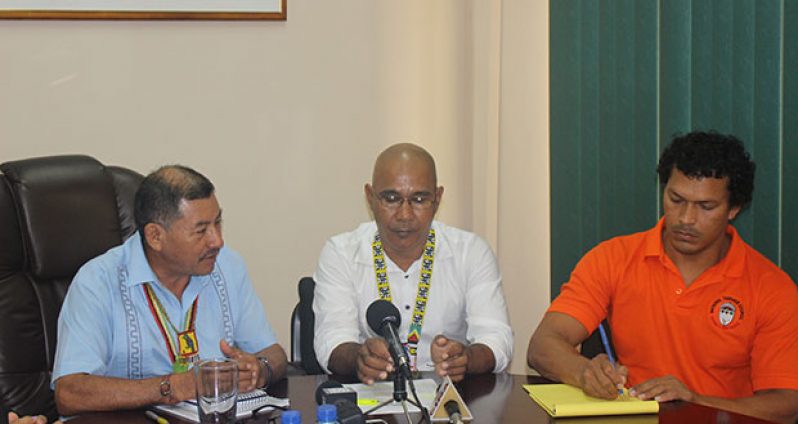-stronger system of governance needed to address issue
By Ravin Singh
DESPITE numerous reports about Trafficking in Persons (TIP) emerging from Indigenous communities across Guyana, Chairman of the National Toshaos Council (NTC) Joel Fredericks has said he is unaware of such practices in these areas. The chairman’s disclosure was made on Friday during a press conference held at the Ministry of Indigenous Peoples’ Affairs, Quamina Street. During the National Toshao Council (NTC) annual conference last week, Minister of Social Protection, Volda Lawrence, revealed that the number of reported cases of TIP and incest in indigenous communities is climbing.
Similar sentiments were expressed by Tenisha Williams, of the Ministry’s TIP Unit, who said that this issue is of growing concern to the ministry. “We have a lot of young women and men who are leaving their villages to venture to other areas in search of jobs…this is a very big issue because most of the time, they are being exploited; they end up in situations where they are taken as slaves or sexual servants, etc,” Williams told indigenous leaders from all across Guyana.
However, when asked what the ministry and the NTC are doing to address this issue, the NTC chairman said that he was unaware that this was happening in indigenous communities.
“I want to say that to my understanding, I never knew that this is happening in indigenous communities. Trafficking in Persons is when an underage person is being taken by someone by false information. That is trafficking in person; underage,” he said.
But the “Combating of Trafficking in Persons Act 2005” does not limit the age of TIP victims to just those under the age of 18. In fact, the Act states that, “Trafficking in persons means the recruitment, transportation, transfer, harbouring or receipt of a person by means of the threat or use of force or other means of coercion, or by abduction, fraud, deception, abuse of power or of a position of vulnerability, or by the giving or receiving of payments or benefits to achieve the consent of a person having control over another person, for the purposes of exploitation.”
Fredericks believes though, that when an adult opts to “go into the mines and do business,” it is not considered trafficking.
“TIP is when you take an underage from a home and do business with them. But if an adult wants to go in the mines and do business, that is their own decision, and that is where the law must come in to address those things.”
He admitted however that even this practice by adults is of concern to the NTC, and that there is a greater need for the Guyana Geology and Mines Commission (GGMC), which is responsible for regulating mining activities, to apply the laws and regulate what is happening in those areas. On the part of the Ministry of Indigenous Peoples’ Affairs however, they are aware of the concerns regarding these incidents and have been working assiduously to curb this practice, Minister Sydney Allicock said.
He keenly pointed out that collaboration between his ministry and the Ministries of Social Protection, Public Health and Natural Resources is ongoing and that the situation has reached a point where “the right seems wrong.”
The minister explained that the ministry has been making visits to communities such as Baramita – which has been reported as having a high TIP rate – and that the school in that village is up and running.
“We have been able to extend more support to the village councils for transport, education and it continues. It’s, expensive but we have been working.”
He also underscored the need for a greater presence of the Guyana Police Force (GPF), noting that there needs to be training for the police on how to deal with sensitive issues such as TIP.
“There needs to be more education into schools and at the level of the village councils. Sometimes there are things which could be easily done, but if you don’t know to do it, then you wouldn’t know how easy it is to do,” he said.
Vice-Chairman of the NTC, Lennox Shuman, also weighed in on the issue, offering that TIP must be addressed holistically. He touched too on the issue of good governance, which he said, is critical to the development of any community in Guyana.
“There needs to be good governance and good governance requires the involvement of the ministry, the NTC, the village councils and other stakeholders. We are hopeful that we would have an opportunity to promote good governance.”
Earlier this year, Guyana was able to move from the Tier 2 Watch List to just Tier 2 in the United States’ latest TIP report. The country had stayed on the Tier 2 Watch List for the last three consecutive years due to its inability to fully comply with the minimum standards for the elimination of trafficking. The 2016 Report also pointed out that the Government of Guyana does not fully meet the minimum standards for the elimination of trafficking, but that it is making significant efforts to do so.




.jpg)










